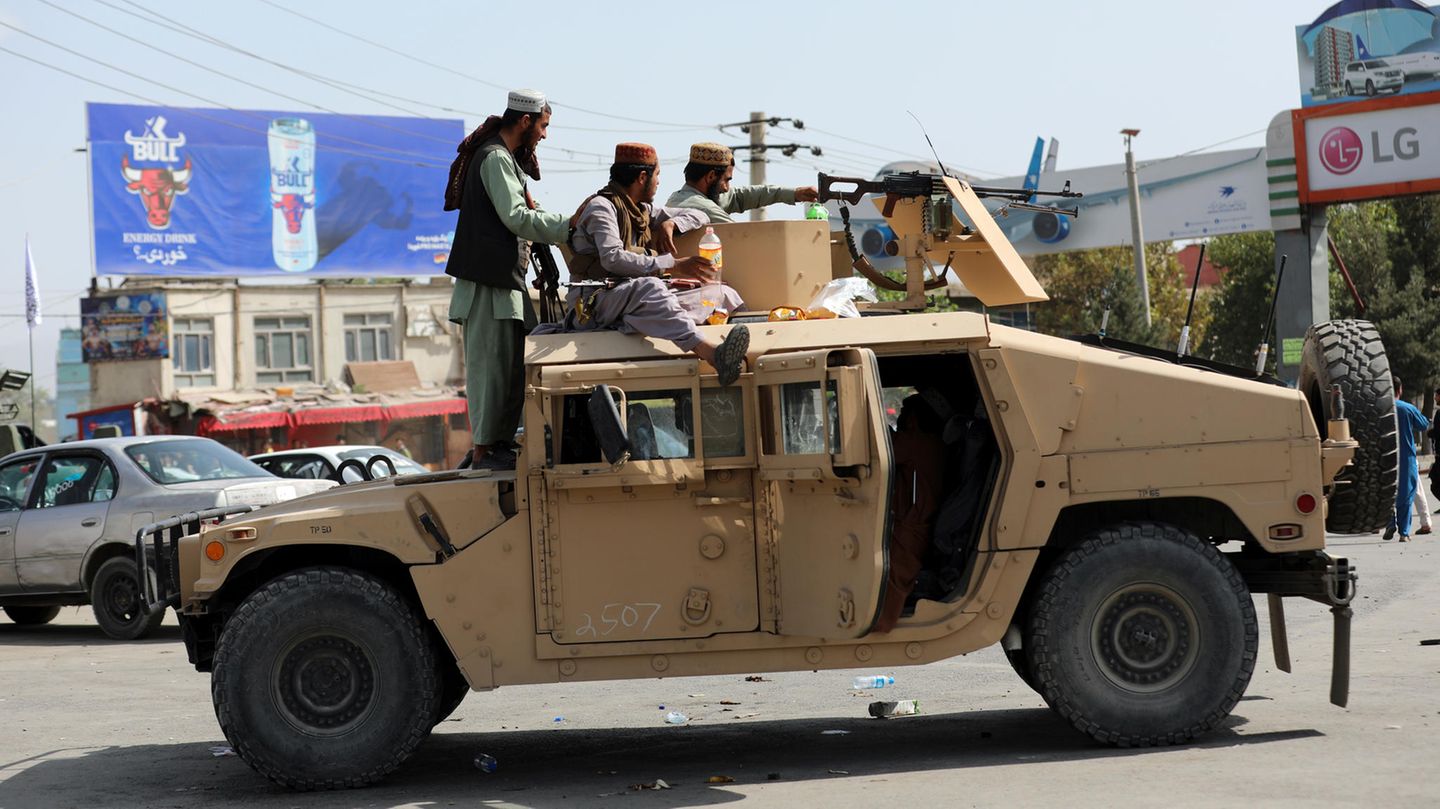Afghanistan is now effectively in the hands of the militant Islamist Taliban. The memory of the former reign of terror makes many Afghans fear the worst for the future.
Kabul has fallen, the power apparatus in Afghanistan has collapsed. On Sunday, the militant Islamist Taliban also conquered the capital of the crisis-ridden country after numerous provincial capitals had previously fallen into their hands. Head of state Ashraf Ghani fled abroad, and the Taliban took his official seat just a few hours later. Negotiations for a “peaceful transfer of power” have begun.
“Today is a big day for the Afghans and the Taliban,” said a Taliban spokesman on Sunday. People would now reap the “fruits of their efforts and sacrifices” over the past 20 years. “Thank God, the war in this country is over now.”
Despite the Taliban’s claims to seek a government of “national unity” and peace for the country, many Afghans fear the Taliban will return to the cruel and repressive practices that governed their previous rule between 1996 and 2001.
The “Islamic Emirate Afghanistan”
It is expected that the Taliban will proclaim a new “Islamic Emirate of Afghanistan” in the coming days – just as they did before the US troops marched in in 2001. At that time, they enforced their idea of a “state of God” with draconian punishments: women and girls were systematically suppressed, artists and the media censored, human rights violations were the order of the day.
The Taliban rule was based on an extremely rigid interpretation of Sharia, Islamic law. Music, dancing, television, and other popular recreational activities such as flying kites were prohibited. Schools for girls were closed, and women were not allowed to work. They also had to wear the full-body burqa. Religious police monitored compliance with the regulations.
The religious students
The name of the militia is derived from the Arabic word “talib” (student). The movement began at Sunni Islamic Koran schools in Pakistan, where many young men who had fled the Soviet occupation of Afghanistan (1979-89) studied. When civil war broke out in Afghanistan after the Soviet withdrawal, the Taliban was founded in the southern Afghan province of Kandahar as an association of fighters with radical Islamic convictions.
The penalties for breaking the law were often draconian. Women accused of adultery were stoned to death. In some regions recently conquered by the Taliban, women have already been banned from attending schools and universities and from leaving the house without a male companion, he reported.
UN Secretary General António Guterres called on the Islamists to exercise restraint. He is particularly concerned about the future of women and girls in Afghanistan, “whose hard-won rights must be protected,” said Guterres on Sunday. He called on the Taliban and everyone else involved to “exercise extreme restraint” and allow humanitarian aid workers unhindered access to the people. The militia announced on Twitter that young girls could go to school as usual on Monday.
The first conquest of power
During the civil war of the 1990s, the Taliban initially had US secret support. Above all, however, they benefited from massive aid from Pakistan. Not only were the Taliban armed with tanks and heavy weapons, but they also had the money to buy the support of local warlords. On September 27, 1996, the Taliban took power in the country when they invaded Kabul.
Women’s rights organizations have made urgent appeals to the federal government to support women’s rights activists and aid workers in Afghanistan when they leave the country. In particular, civilian actors who campaigned for women’s rights are now in danger of death, according to a statement from the organization. “The Taliban are already taking revenge on women who stand up for their rights or who have campaigned,” said Terre des Femmes’ deputy chairman Inge Bell on Monday.
Reports of draconian penalties
Videos and pictures of two suspected criminals who were reportedly being led through the city on a rope by militant Islamist Taliban fighters also caused a stir. The videos circulating on social networks show how the men, whose faces are painted with black paint, are first placed on a pedestal and then led across a street on a rope. There was initially no independent confirmation of the authenticity of the recordings. In a video filmed near the dais, the men shout “God is great” and “Long live the Islamic Emirate of Afghanistan”.
Meanwhile, the reported that the Taliban in a town north of Lashkargah had hung two men so that they could be seen at the entrance to the town. The men were accused of kidnapping children.
The fall
After the terrorist attacks carried out by al-Qaeda on September 11, 2001 in the USA, the then US President George W. Bush made the Taliban jointly responsible. Afghanistan was the first target of his “war on terror”. In October 2001 the US and its allies moved into Afghanistan, and the Taliban had been overthrown in December.
The situation in the city of Kabul itself was tense on Monday, but initially calm. The Taliban occupied police stations and other government buildings everywhere in Kabul, as reported by residents of the German press agency. Armed fighters drove through the city in military and police cars, as well as other government vehicles. At the same time they set up additional checkpoints of their own in some streets.
You can see in the video: “Left lying around like food for the terrorists” – Lorena’s father-in-law worked for the Bundeswehr – now he fears for his life in Kabul.
A Taliban spokesman said that “no one is allowed to enter someone else’s home without permission.” Thousands of fighters are said to be on the way to Kabul to ensure “security” there. Mullah Abdul Ghani Baradar, one of the founders of the Taliban, called on militiamen to discipline in an online video: “Now is the time to prove that we can serve our nation and ensure safety and a comfortable life.”
“I asked my wife if there were enough burqas for her and the girls”
Obviously, many Afghans do not want to believe in this. Hundreds or maybe even thousands of people have made their way to the airport since Sunday to flee the country after the seizure of power (). Pictures in social media show how they are standing all over the civilian part of the airport premises or climbing over turntable ladders to get on an airplane.
Others are apparently beginning to prepare for life under strict Islamic rule. “My first concern was to grow my beard as quickly as possible,” Reuters news agency quoted a man from Kabul as saying. “I asked my wife if there were enough burqas for her and the girls.”
Die Offensive
In 2018, the first direct talks between the administration of then US President Donald Trump and the Taliban began in Doha, Qatar. The talks resulted in an agreement on February 29, 2020, in which a timetable for the withdrawal of US troops was set out. The withdrawal was delayed in the meantime, but then began under Trump’s successor Joe Biden in May. At the same time as the USA, the other NATO troops withdrew from Afghanistan, including the Bundeswehr. The withdrawal is now almost complete, while the Taliban have brought much of the country’s territory and almost all major cities under their control.
Many Western countries were surprised at the rapid pace at which the Taliban took one city after another, some of them without a fight, over the past few days. On paper, the Taliban were inferior to the Afghan armed forces. It is estimated that around 300,000 police and army personnel faced around 60,000 less well-equipped Taliban fighters.
However, these benefit from their brutal reputation, which they earned during their rule in the 1990s with public executions or flogging. They surrendered many security forces through psychological warfare and the use of social media. Elsewhere, local politicians, elders and tribal leaders agreed over the heads of the security forces to surrender with the Taliban.
Still, Taliban co-founder and negotiator Mullah Abdul Ghani Baradar was surprised at how quickly the country had come under the control of the Taliban. “We achieved a victory that was not expected,” he said in an online video reported by the Guardian. “We should show humility before Allah.”
David William is a talented author who has made a name for himself in the world of writing. He is a professional author who writes on a wide range of topics, from general interest to opinion news. David is currently working as a writer at 24 hours worlds where he brings his unique perspective and in-depth research to his articles, making them both informative and engaging.




